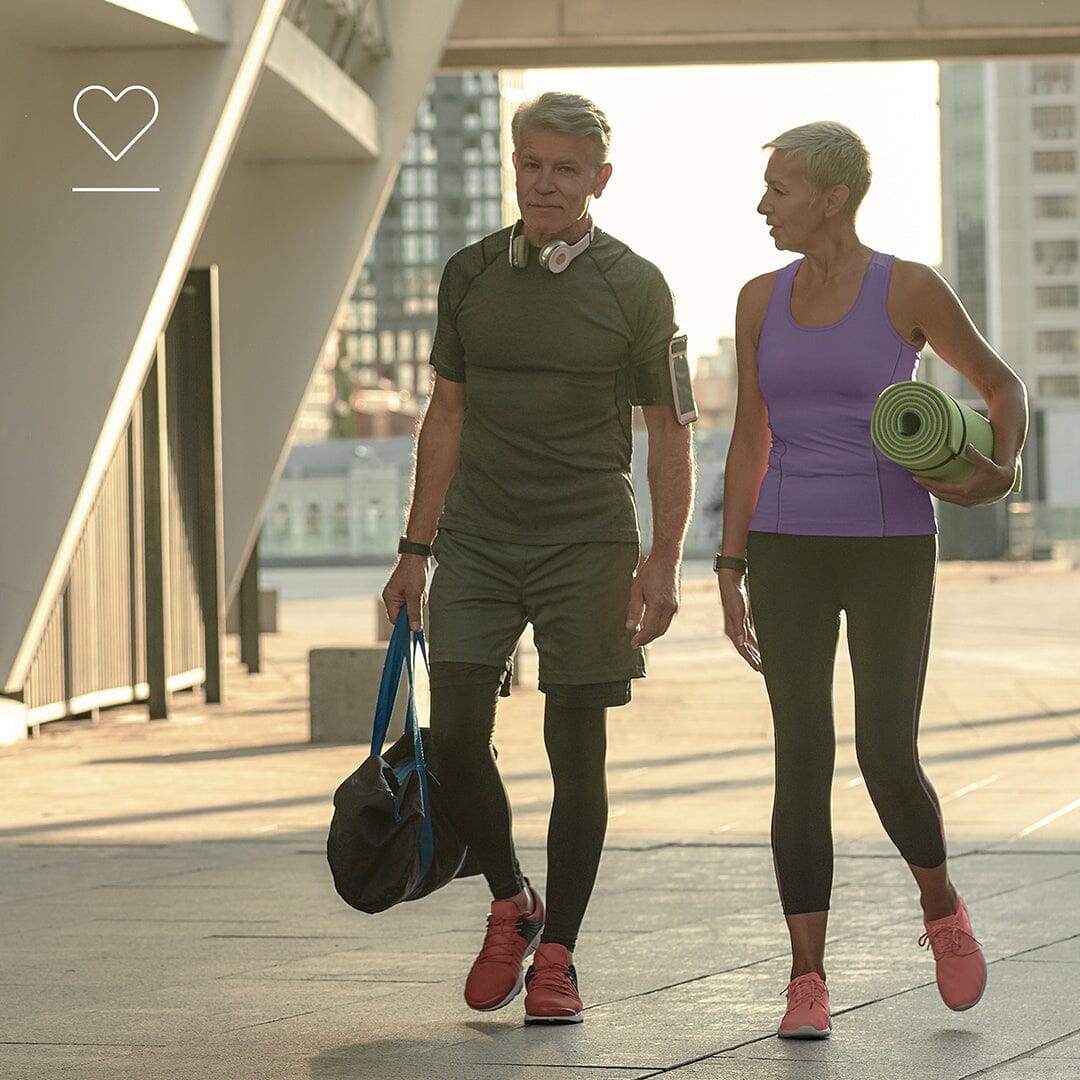There are many ways you can use lifestyle to boost your immune system and this is particularly important as you age.
Regular movement
Exercise has numerous benefits for your health, no matter what age you are. When it comes to your immune health, regular exercise can help to reduce levels of inflamm-ageing in the body.
Exercise reduces visceral fat – or fat stored in the region of the abdomen – which increases the levels of inflammation. It has been associated with lower levels of inflammatory molecules and higher levels of anti-inflammatory molecules. The ratio of T cells is also favourably improved through exercise, thereby improving immune response[1].
Healthy diet
Good nutrition can improve immune function in many ways and eating a wholefoods diet and avoiding processed foods is advisable throughout our lives.
The Mediterranean diet is well studied for improving health through reducing inflammation in the body and it is no surprise that it helps to improve immune function in older adults. Consisting of plenty of fruit, vegetables, wholegrains, lean meat, nuts, seeds and olive oil, this diet is worth exploring for overall health.
Eating a variety of wholefoods and different coloured fruits and vegetables ensures that you are consuming a wide range of vitamins and minerals. Eating locally and seasonally utilises the power of nature in helping to defend against your environment. If you have fruit trees or a vegetable garden close by, this is perfect, as these plants have grown in the environment where you live. Plants naturally defend themselves against the environment they grow in as a means of survival – by eating these plants, you benefit from these defences also.
A diet high in vegetables provides the fiber needed to help eliminate waste, whilst also encouraging good bacteria in the digestive system. Foods such as jerusalem artichoke, garlic, onions, leeks, chicory and bananas are great additions to the diet to encourage a healthy breeding ground for good bacteria and a healthier immune system.
Herbs and spices can be used to warm the body during the colder months, or whilst nursing a cold. Foods such as ginger, garlic, onions and honey are considered natural antibiotics and should be included in the diet particularly at this time of year.
Supplementation
Many of us reach to vitamin C at the first sign of a cold and during the winter season. There are numerous vitamins, minerals and herbs that can be used to support or enhance a healthy immune system.
Vitamin D plays a significant role in regulating a healthy immune response. Maintaining healthy vitamin D levels becomes harder as you age. Vitamin D is synthesised when the skin when exposed to sunlight, this generates chemicals which are carried to the liver and kidneys to be converted into vitamin D. As your skin, liver and kidney function declines with age, so does your capacity to produce vitamin D.
Zinc is another key nutrient in a healthy immune system and plays a key role in wound healing. Again, zinc levels are often lower in older adults, due to factors such as inadequate dietary intake, or levels of infection or inflammation in the body.
Senolytics is a term used to describe lifestyle strategies and supplements that help the body to remove senescent cells – cells that have reached the end of their productive life but remain in the body adding to inflammation. Recent studies have identified natural compounds such as fisetin and dietary strategies, such as intermittent fasting to support the body reduce inflamm-aging. Read more in our blog Zombie cells – what are they.
Prebiotics and probiotics help encourage good bacteria in the gut. In addition to prebiotic and probiotic foods, you may benefit from an extra boost through probiotic supplements. The digestive system plays a significant role in immune health and overall health, and the famous greek physicial Hippocrates, once stated that “all disease begins in the gut”. We now know that most disease is caused by aging – which affects all aspects of the body including the gut and immune system.
Suzy Walsh
BBA (Hons)., BNat., mNMHNZ
Registered Naturopath & Medical Herbalist
References:
[1] Duggal, N. A. (2018). Reversing the immune ageing clock: Lifestyle modifications and pharmacological interventions. Biogerontology, 19(6), 481-496. doi: 10.1007/s10522-018-9771-7


![Never Grow Old - Longevity Issue [Nutrition Business Journal]](http://scienceresearchwellness.com/cdn/shop/articles/NBJ_Post_-_LinkedIn.jpg?v=1692742979&width=1500)
![Circulatory system care "vital" [NZHERALD]](http://scienceresearchwellness.com/cdn/shop/articles/SRW_-_News_Clip_-_Post_-_Cir1_-_D1_dfadc7dc-c57a-4f80-82bd-4fdb5ba5f0cd.jpg?v=1692742734&width=1500)
